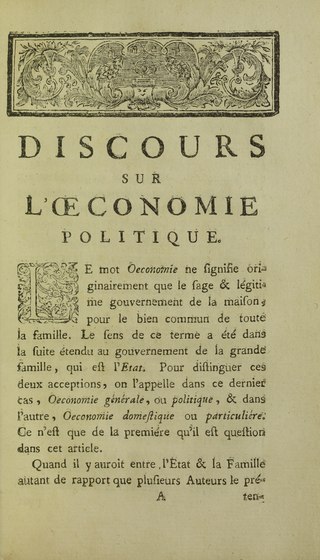Related Research Articles

Political economy is the study of how economic systems and political systems are linked. Widely studied phenomena within the discipline are systems such as labour markets and financial markets, as well as phenomena such as growth, distribution, inequality, and trade, and how these are shaped by institutions, laws, and government policy. Originating in the 16th century, it is the precursor to the modern discipline of economics. Political economy in its modern form is considered an interdisciplinary field, drawing on theory from both political science and modern economics.
Decentralization or decentralisation is the process by which the activities of an organization, particularly those regarding planning and decision making, are distributed or delegated away from a central, authoritative location or group.

Autocracy is a system of government in which absolute power over a state is concentrated in the hands of one person, whose decisions are subject neither to external legal restraints nor to regularized mechanisms of popular control.

A federation is a political entity characterized by a union of partially self-governing provinces, states, or other regions under a central federal government (federalism). In a federation, the self-governing status of the component states, as well as the division of power between them and the central government, is typically constitutionally entrenched and may not be altered by a unilateral decision, neither by the component states nor the federal political body. Alternatively, a federation is a form of government in which sovereign power is formally divided between a central authority and a number of constituent regions so that each region retains some degree of control over its internal affairs.
Race to the bottom is a socio-economic phrase to describe either government deregulation of the business environment or reduction in corporate tax rates, in order to attract or retain usually foreign economic activity in their jurisdictions. While this phenomenon can happen between countries as a result of globalization and free trade, it also can occur within individual countries between their sub-jurisdictions. It may occur when competition increases between geographic areas over a particular sector of trade and production. The effect and intent of these actions is to lower labor rates, cost of business, or other factors over which governments can exert control.

Douglass Cecil North was an American economist known for his work in economic history. He was the co-recipient of the 1993 Nobel Memorial Prize in Economic Sciences. In the words of the Nobel Committee, North and Fogel "renewed research in economic history by applying economic theory and quantitative methods in order to explain economic and institutional change."
As a subfield of public economics, fiscal federalism is concerned with "understanding which functions and instruments are best centralized and which are best placed in the sphere of decentralized levels of government". In other words, it is the study of how competencies and fiscal instruments are allocated across different (vertical) layers of the administration. An important part of its subject matter is the system of transfer payments or grants by which a central government shares its revenues with lower levels of government.
The tiao-kuai system, also known as tiaotiao-kuaikuai to emphasize the plurality, describes the quasi-federal arrangement of administration in the People's Republic of China. The term tiáo refers to the vertical lines of authority over various sector reaching down from the ministries of the central government. Kuài refers to the horizontal level of authority of the territorial government at the provincial or local level. According to political scientist Kenneth Lieberthal, "The former coordinates according to function ; the latter coordinates according to the needs of the locality that it governs." Thus a local environmental protection bureau may have reporting responsibilities to both the central government's State Environmental Protection Administration and to the mayor of the city in which it is located.
Multi-level governance is a term used to describe the way power is spread vertically between many levels of government and horizontally across multiple quasi-government and non-governmental organizations and actors. This situation develops because many countries have multiple levels of government including local, regional, state, national or federal, and many other organisations with interests in policy decisions and outcomes. International governance also operates based on multi-level governance principles. Multi-level governance can be distinguished from multi-level government which is when different levels of government share or transfer responsibility amongst each other. Whereas multi-level governance analyses the relationship of different state levels and interaction with different types of actors.'
Dual federalism, also known as layer-cake federalism or divided sovereignty, is a political arrangement in which power is divided between the federal and state governments in clearly defined terms, with state governments exercising those powers accorded to them without interference from the federal government. Dual federalism is defined in contrast to cooperative federalism, in which federal and state governments collaborate on policy.
United States of China is a political concept first devised in the early 1920s by Chen Jiongming of a federalized China modeled closely after the United States of America. Given the political, social and linguistic realities of China in the warlord period, Chen Jiongming believed that a federalist approach was the only feasible way to eventually establish a united, democratic republic. Beginning with Guangdong as a model state, he wanted to organize a "United States of China in the manner of the American experience" through negotiation with federalists from all parts of the country.
Paradiplomacy is the involvement of non-central governments in international relations. The phenomenon includes a variety of pratices, from town twinning to transational networking, decentralized cooperation, and advocacy in international summits. Following the movement of globalisation, non-central governments have been playing increasingly influential roles on the global scene, connecting across national borders and developing their own foreign policies. Regions, states, provinces and cities seek their way to promote cooperation, cultural exchanges, trade and partnership, in a large diversity of ways and objectives depending on their decentralization, cultural, and socio-economical contexts. This trend raises new interesting questions concerning public international law and opens a debate on the global governance regime, and the evolution of the nation-led system that has provided the grounds for the international political order in the last centuries.
Dali L. Yang is an American political scientist and sinologist. He is the William Claude Reavis Professor in the Department of Political Science and Senior Advisor to the President and Provost on Global Initiatives at The University of Chicago. Between 2010 and 2016, he was the founding Faculty Director of the University of Chicago Center in Beijing, a university-wide initiative to strengthen exchanges and collaboration with Chinese academic institutions. He is also a non-resident Senior Fellow at the Chicago Council on Global Affairs. He is a member of the Committee of 100, a member of the National Committee on U.S.-China Relations, and a member of the China Committee of the Chicago Sister Cities International Program. He is also on the Advisory Board of the Paulson Institute at the University of Chicago.

Nora Lustig is the Samuel Z. Stone Professor of Latin American Economics and the Director of the CEQ Institute at Tulane University, and a non-resident Fellow at the Center for Global Development and the Inter-American Dialogue.
Vincent Alfred Ostrom was an American political economist and the Founding Director of the Ostrom Workshop based at Indiana University and the Arthur F. Bentley Professor Emeritus of Political Science. He and his wife, the political economist Elinor Ostrom, made numerous contributions to the field of political science, political economy, and public choice.
Chinese scholars, thinkers, and policy-makers have debated about democracy, an idea which was first imported by Western colonial powers but which some argue also has connections to classic Chinese thinking. Starting in the mid-eighteenth century, many Chinese argued about how to deal with the ever-encroaching Western culture. Though Chinese Confucians were initially opposed to Western modes of thinking, it became clear that aspects of the West were appealing. Industrialization gave the West an economic and military advantage. The devastating defeats of the First and Second Opium Wars compelled a segment of Chinese politicians and intellectuals to rethink their notion of cultural and political superiority. Democracy entered the Chinese consciousness because it was the form of government used in the West, potentially responsible for its industrial, economic and military advancements. A segment of Chinese scholars and politicians became persuaded that democratization and industrialization were imperative for a competitive China. In response, a number of scholars resisted the idea, saying democracy and Westernization had no place in traditional Chinese culture. Liang Shuming's opinion was most popular, holding that democracy and traditional Chinese society were completely incompatible, hence China's only choice was either wholesale Westernization or complete rejection of the West. The debate centered on the philosophical compatibility of traditional Chinese Confucian beliefs and the technologies of the West.

Why Nations Fail: The Origins of Power, Prosperity, and Poverty, first published in 2012, is a book by economists Daron Acemoglu and James A. Robinson. The book applies insights from institutional economics, development economics and economic history to understand why nations develop differently, with some succeeding in the accumulation of power and prosperity and others failing, via a wide range of historical case studies.

Barry Robert Weingast is an American political scientist and economist, who is currently the Ward C. Krebs Family Professor at Stanford University and a Senior Fellow at the Hoover Institution. Weingast's research concentrates on the relationship between politics and economics, particularly economic reform, regulation, and the political foundation of markets.
The Financial Revolution was a set of economic and financial reforms in Britain after the Glorious Revolution in 1688 when William III invaded England. The reforms were based in part on Dutch economic and financial innovations that were brought to England by William III. New institutions were created: a public debt and the Bank of England (1694). Soon thereafter, English joint-stock companies began going public. A central aspect of the financial revolution was the emergence of a stock market.
Ethnic federalism, multi-ethnic or multi-national federalism, is a form of federal system in which the federated regional or state units are defined by ethnicity. Ethnic federal systems have been created in attempts to accommodate demands for ethnic autonomy and manage inter-ethnic tensions within a state. They have not always succeeded in this: problems inherent in the construction and maintenance of an ethnic federation have led to some states or sub-divisions of a state into either breaking up, resorting to authoritarian repression, or resorting to ethnocracy, ethnic segregation, population transfer, internal displacement, ethnic cleansing, and/or even ethnicity-based attacks and pogroms.
References
- 1 2 Weingast, Barry (1995), "The Economic Role of Political Institutions: Market-Preserving Federalism and Economic Development", Journal of Law, Economics, & Organization, 20 (1): 1–31.
- 1 2 Montinola, Gabriella; Qian, Yingyi; Weingast, Barry (1995), "Federalism, Chinese style: The political basis for economic success in China" (PDF), World Politics, 48 (1): 50–81, doi:10.1353/wp.1995.0003, S2CID 43617501